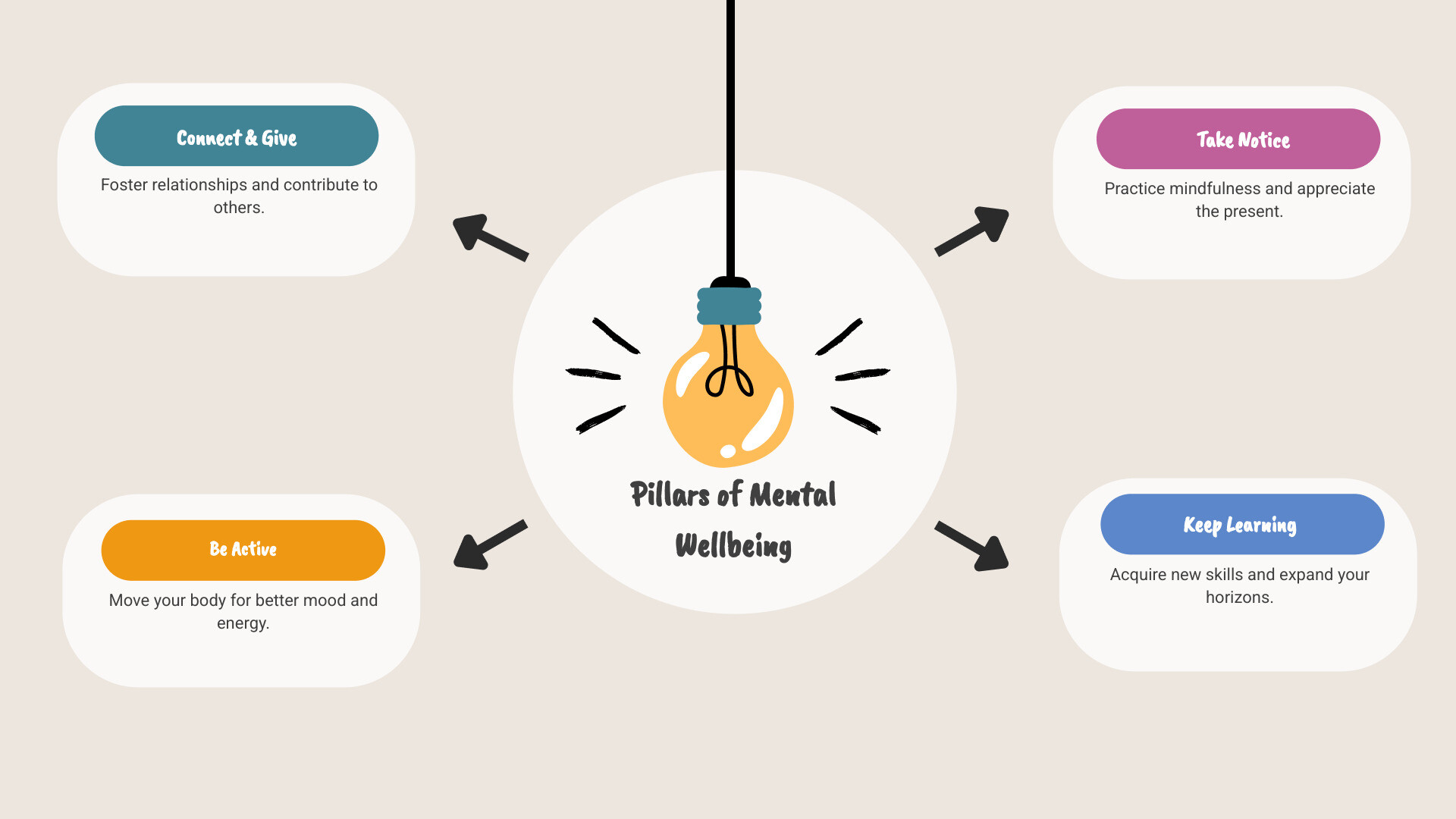What Mental Wellbeing Really Means and Why It Matters
Mental wellbeing is your unique way of handling emotions, responding to stress, and maintaining your outlook on life. It’s not about being happy all the time, but having the tools and inner strength to build a meaningful life.
Here’s what good mental wellbeing looks like:
- Emotional balance – You can feel and process emotions without being overwhelmed
- Stress resilience – You bounce back from challenges and setbacks
- Positive relationships – You connect meaningfully with others
- Sense of purpose – You feel your life has meaning and direction
- Self-confidence – You believe in your abilities and worth
Mental wellbeing affects everything, from your morning routine to your relationships. Research shows that good mental wellbeing helps people reach their potential, maintain strong relationships, and contribute to their communities.
The good news is that mental wellbeing isn’t fixed. Like physical fitness, you can strengthen it with daily habits.
Small, consistent actions-like a five-minute meditation, a walk at lunch, or calling a friend-add up to create lasting change.

Simple guide to mental wellbeing terms:
Understanding Mental Wellbeing and Why It Matters
Mental wellbeing is more than the absence of a mental health condition; it’s a state where your emotional, psychological, and social health work in harmony.
When your mental wellbeing is thriving, you’re not just surviving-you’re actively engaging with life. You can cope with stress, work productively, connect with your community, and realize your potential.
Good mental wellbeing appears as positive self-esteem and confidence. It’s the inner strength that helps you steer challenges, bounce back from setbacks, and maintain meaningful relationships. This building resilience is like developing an emotional immune system.
Your mind and body are deeply connected. Poor mental wellbeing can cause physical symptoms like headaches or fatigue, while good mental health can improve physical outcomes like immunity and heart health.
This is why we champion proactive self-care. Just as with physical fitness, mental wellbeing benefits from consistent, daily attention.
At Beyond Beauty Lab, we understand that true wellness includes both inner and outer health. Investing in your mental wellbeing creates the foundation for everything else, including the natural glow that comes from feeling genuinely good about yourself.
For a deeper understanding of how emotions impact your overall wellness journey, explore our guide on Emotional Health. And to see how mental wellbeing fits into the bigger picture of holistic living, check out The Ultimate Guide to Wellness and Well-Being.
The 5 Pillars of Daily Mental Wellbeing
Building better mental wellbeing doesn’t require dramatic life changes. The most powerful approach involves five simple, evidence-based practices from the New Economics Foundation. Think of them as gentle guideposts to adapt to your life. Start small, be patient, and remember that even tiny steps matter.

These five pillars work together to create a strong foundation for daily mental wellbeing. You can dive deeper into the research behind this approach through the Five Ways to Wellbeing research and find practical ways to implement them with our Wellness Practice Tips.
Pillar 1: Connect with Others
Human connection is vital for our minds. Meaningful relationships create a support network that builds resilience. Quality time with loved ones doesn’t have to be elaborate. Turn off the TV during dinner, schedule coffee with a colleague, or call a friend. These simple connections can transform your day.
Don’t be afraid to share your feelings with trusted people; it helps you process emotions and feel less alone. Community involvement also opens doors to new friendships. Consider volunteering at a local school or food bank-you can find opportunities by searching online for local organizations. Peer support is also powerful, offering comfort from those with shared experiences.
Pillar 2: Be Physically Active
Your body and mind are partners. Moving your body releases mood-boosting endorphins and raises self-esteem. Find movement you enjoy, like walking in nature, doing home workouts, dancing, or gardening.

Everyday activities like cleaning or playing with your kids also count. If mobility is a concern, explore gentle options like chair exercises, which still offer mental health benefits. Setting fitness goals, like a daily 10-minute walk, builds confidence that carries into other areas of your life.
For more inspiration on integrating movement into your wellness routine, explore our Best Wellness Practices.
Pillar 3: Take Notice (Mindfulness)
In our busy world, we often miss the present moment. Being present through mindfulness means paying attention to your surroundings and appreciating small moments without judgment. This can be as simple as truly tasting your coffee or noticing the sunlight on your skin. These moments of awareness help reduce rumination.
Meditation doesn’t require hours; start with a few minutes of focused breathing. When your mind wanders, gently return your focus to your breath. This strengthens your ability to stay present. Hands-on activities like crafts or cooking can also focus your mind.
For deeper breathing techniques that support inner calm, visit The Power of Breathwork for Wellness and Inner Glow. You can also weave mindfulness into your daily routine with our Mindful Beauty Routines.
Simple mindfulness exercises to try today:
- 5-4-3-2-1 Sensory Check: Notice 5 things you can see, 4 you can feel, 3 you can hear, 2 you can smell, and 1 you can taste
- Mindful Eating: Choose one bite of food and experience it fully – its texture, temperature, and flavors
- Body Scan: Lie down and slowly notice sensations in different parts of your body without trying to change anything
Pillar 4: Keep Learning
New skills are gifts to your future self. Learning boosts confidence, provides a sense of purpose, and can lead to new social connections. Try a new hobby like cooking a new recipe, learning an instrument, or reading a book.
Taking an online course is easier than ever; you can Find free online courses on FutureLearn on almost any topic. The beauty of learning is in the process. Don’t worry about becoming an expert-focus on the joy of findy and the satisfaction of progress.
For more ways to integrate learning into your wellness journey, explore our Wellness Education Resources.
Pillar 5: Give to Others
Acts of kindness create a ripple effect that benefits everyone. When you help a neighbor, volunteer, or listen to a friend, you create positive feelings and a sense of reward for yourself. Simple acts like thanking someone genuinely or offering practical help fit into any schedule.
Donating to charity or volunteering connects you to causes larger than yourself, providing deep satisfaction. The key is to give from a place of genuine care, not obligation, so it becomes a source of energy.
This practice of giving is actually a profound form of self-care. Learn more about Why Self-Care Is Important and how generosity fits into caring for yourself.
Foundational Self-Care for Your Mind and Body
The foundation of strong mental wellbeing rests on physical self-care. Like a garden, your mind needs the right conditions to flourish. Your mind and body work together, and when we neglect our physical health, our mental state often suffers. Poor sleep can make us irritable, while skipping meals affects our mood. When we nourish our bodies, our minds feel clearer and more resilient.

This mind-body connection is at the heart of wellness. It’s not about perfection but creating sustainable habits. Small, consistent changes to your sleep, diet, and daily structure can create profound shifts in how you feel.
For deeper insights into this interconnected approach, explore our guide on Holistic Wellness: The Secret to Long-Lasting Beauty and practical Health Self-Care strategies.
Prioritize Quality Sleep
Sleep is essential to your mental wellbeing. When you’re sleep-deprived, everything feels harder and small problems can feel overwhelming. Quality sleep is a reset button for your mind.
Good sleep hygiene starts with a consistent schedule; try to go to bed and wake up around the same time daily. An hour before bed, start a winding down routine like reading a book or taking a warm bath. Limiting screen time is crucial, as the blue light can suppress melatonin. Put devices away at least an hour before sleep.
Create a comfortable sleep environment that is cool, dark, and quiet. Be mindful of caffeine and alcohol, as they can disrupt sleep quality. Even if you can’t sleep, simply resting in bed is beneficial.
For more guidance on optimizing your sleep, check out our Beauty Sleep Tips and try our Essential Oils Roller Blend for Restful Sleep.
Fuel Your Brain with a Healthy Diet
What you eat directly impacts your mood and concentration. A balanced diet of fruits, vegetables, whole grains, and lean proteins provides steady fuel for your brain and helps maintain stable blood sugar levels.
Hydration is also key; even mild dehydration can affect your mood. Health experts agree on the importance of hydration, so aim to drink water throughout the day. Certain nutrients, like vitamin B12 and omega-3 fatty acids, are linked to mental health.
Reducing sugar and processed foods can stabilize your energy and mood. Be mindful of your caffeine and alcohol intake, as they can increase anxiety and worsen sleep. Your gut health also influences your mental state through the powerful gut-brain connection. Learn more about this relationship in our article on The Connection Between Gut Health and Glowing Skin.
Create Nurturing Routines
Routines are powerful tools for supporting your mental wellbeing. They provide structure, reduce decision fatigue, and create space for what matters. Morning rituals, even just for five minutes, set the tone for your day. Try gentle stretching or enjoying coffee without distractions. Our Morning Wellness Rituals That Set the Tone for a Beautiful Day offers inspiring ideas.
Evening wind-down routines help you transition to a state of rest. Our Mindful Beauty Evening Ritual can guide you. Setting boundaries is a vital form of self-care. Learning to say no protects your mental space.
In our hyperconnected world, digital detox periods are also essential. Schedule regular breaks from screens to avoid feeling anxious and scattered. Consider a full Digital Detox: A Wellness Reset for Your Mind and Skin to reset your relationship with technology.
When to Seek Professional Support
Sometimes, daily self-care and mental wellbeing practices aren’t enough. Recognizing when you need professional attention is a sign of strength. It’s okay to ask for help.
Recognizing the need for support can be tricky, as challenges often develop gradually. While resilience is important, there’s a difference between normal stress and something requiring professional intervention.
Key signs include:
- Persistent sadness or hopelessness that lasts for weeks and affects your daily life.
- Overwhelming anxiety, constant worry, or panic attacks that interfere with your routine.
- Struggling to cope with daily life, where simple tasks feel impossible.
- Withdrawing from others and losing interest in activities you once enjoyed.
- Significant changes in your sleep or appetite.
If you have thoughts of self-harm or harming others, seek immediate professional help. Reach out to a crisis helpline or go to an emergency room.
When self-help isn’t enough, your primary care doctor is a good starting point. They can assess your situation and refer you to a mental health specialist. A therapist can provide personalized strategies and support. The NIH Wellness Toolkits for support offer excellent resources.
Seeking help is a sign of strength, not weakness. You deserve support. For more guidance on this journey, explore our comprehensive guide on How to Improve Mental Health.
Frequently Asked Questions about Mental Wellbeing
Navigating mental wellbeing can feel overwhelming. Here are answers to some common questions from our community.
What is the difference between mental health and mental wellbeing?
Mental health is your overall state of emotional, psychological, and social well-being. It exists on a spectrum, just like physical health. Mental wellbeing, on the other hand, is the positive side of that spectrum. It’s about feeling good, functioning well, and having the capacity to thrive. You can have a diagnosed mental health condition and still work to improve your mental wellbeing by building coping tools and finding the right support.
How can I practice mental wellbeing on a busy schedule?
You don’t need long sessions to practice mental wellbeing. The key is to weave small, consistent actions into your day. Focus on micro-moments of self-care, like a 5-minute meditation while your coffee brews, a short walk during lunch, or mentally listing three good things from your day before bed. These small habits add up to create real change.
For more realistic approaches, check out our 5-Minute Wellness Tips for Busy Women.
Can improving my mental wellbeing also improve my physical health?
Yes, there is a strong link between mental and physical health. Improving your mental wellbeing can lead to significant physical benefits. For example, good mental wellbeing can reduce the risk of chronic physical conditions by helping you manage stress better. Lower stress levels benefit cardiovascular health. When you feel mentally balanced, you’re more motivated to eat well, exercise, and get better sleep, which improves physical repair. A resilient mind can also boost your immune system, helping you feel more energetic overall.
Conclusion
Your mental wellbeing journey is an ongoing process. As we’ve explored, true wellness isn’t about perfection; it’s about showing up for yourself with small, daily acts of kindness.
The five pillars-connecting, being active, taking notice, learning, and giving-are invitations to weave more joy and resilience into your life. Each small action, like calling a friend or trying a new recipe, builds on the last.
Consistency beats perfection. A five-minute meditation or a short walk can create ripples of positive change. Some days will be easier than others. Mental wellbeing is like tending a garden; it requires regular care and patience. On challenging days, be gentle with yourself and remember that seeking professional support is a sign of strength.
At Beyond Beauty Lab, we believe true beauty radiates from within. Your mental wellbeing is the foundation that allows your inner light to shine. When you feel good mentally, it shows.
You now have tools to support your mental wellness journey. Trust the process and celebrate every small victory. Explore our full range of wellness resources to continue your journey and find even more ways to support your mental wellbeing.







